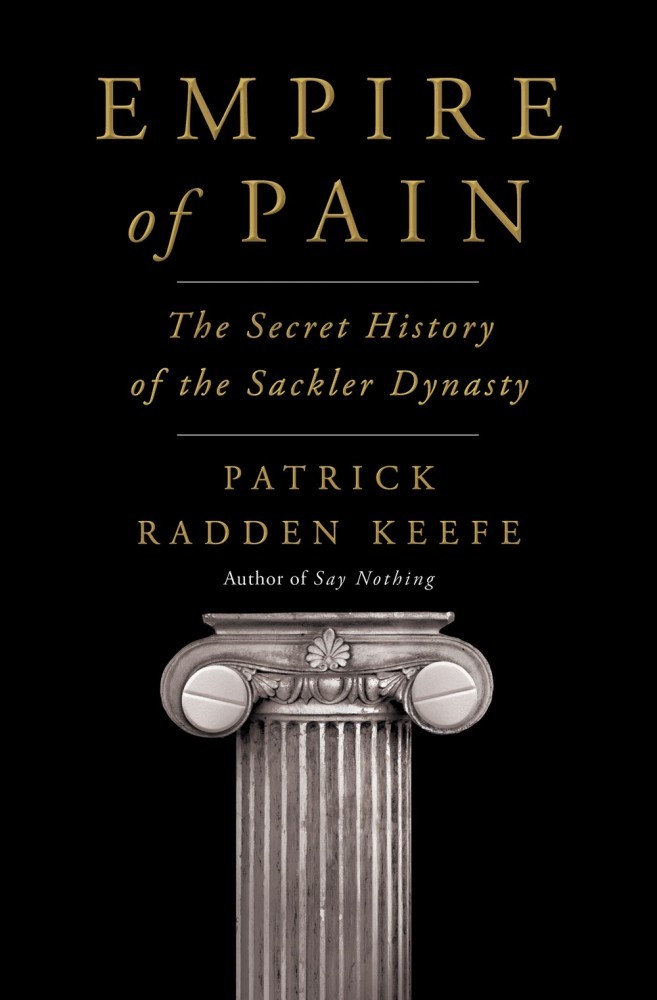Address change to reviews.pivic.com
This site is changing its address.
From Patrick Radden Keefe’s brilliant book Empire of Pain: The Secret History of the Sackler Dynasty:

As the negative publicity continued to swirl around OxyContin, Richard Sackler was privately seething. “The whole thing is a sham,” a sympathetic friend reassured him. If people die because they abuse the drug, “then good riddance.” “Unfortunately, when I’m ambushed by 60 Minutes, I can’t easily get this concept across,” Richard replied. He had no doubts about what exactly was going on, but that didn’t mean he could just come out and say it. “Calling drug addicts ‘scum of the earth’ will guarantee that I become the poster child for liberals” who want to “distribute the blame to someone else,” he complained.
Richard never made any connection, at least not publicly, between the sort of hateful rhetoric he employed to describe people who suffered from addiction and the secret drug-related tragedy of his own cousin Bobby Sackler. But as it happened, one of those drug addicts that he so vilified worked just a few feet away from Richard, outside Howard Udell’s office on the ninth floor. “At some point, I became addicted to OxyContin,” Martha West later testified. “I was starting to unravel.” She had quit drinking eight years earlier, but now she started again. “Once the Oxy is out of your system, you start going into narcotics withdrawal,” she continued, and one symptom of the withdrawal was back pain.
“I didn’t know that’s what was causing it,” she said, so she just took more pills. “I thought my condition was getting worse, and it—it turns out it wasn’t. It was the medication that was making it seem that way.” Gradually, her judgment started to slip. She did stupid things. Dangerous things. She started trying other drugs. At one point, she found herself in Bridgeport, buying cocaine. Eventually, she was fired by Purdue. After twenty-one years at the company, she was let go for “poor work performance” and escorted out of the building by security. When she asked one of the lawyers at the company if she could come back to retrieve some personal files from her computer, the lawyer said that her hard drive had been erased, so there was nothing left to retrieve.
Martha West eventually sued Purdue, though the suit never went anywhere. When she was deposed in a separate lawsuit against the company, in 2004, she told the story of how Howard Udell had asked her to prepare the memo on the ways in which OxyContin was being abused. She had a very distinct memory of having written the memo, but in discovery attorneys were not able to find it in Purdue’s files.
The existence of the memo was subsequently confirmed, however, by a Justice Department investigation, and by Purdue Pharma itself. West’s memo had been dated June 1, 1999, and described “numerous discussions of misuse and abuse of Purdue products, in particular, OC.” In the deposition, she also recalled the moment when she learned that Purdue was planning to produce a 160-milligram OxyContin pill. “They are killing themselves with the 80s,” West wrote to Udell. “Why would we come out with a 160?” According to West, as soon as Udell received her email, he stormed out of his office and said, “What are you doing? If this ever comes out in discovery we are screwed.” So she deleted the email, and presumably so did he. (Purdue ended up pulling the 160-milligram pill from the market in the spring of 2001.)
The company’s handling of Martha West closely mirrored Richard Sackler’s general attitude toward the abuse of OxyContin. While Purdue did not deny that she had become addicted to the drug, company lawyers suggested that she was an individual with a problem. Purdue obtained her health records, and a lawyer questioned her about her history of addiction. Was OxyContin not just the latest entry in a litany of substances she had abused? The company got hold of hospital records and confronted her with them during the deposition, reading aloud notes that were made after she was admitted: “Patient is completely focused on revenge concerning her termination from work…obsessive screaming on how to get back at them, plans millions of ways to humiliate this company, including her suing them, buying them out, and firing everyone she knows.”
West was, by her own admission, a damaged, unstable person, and Purdue now painted her as an irresponsible, vengeful fabulist—precisely the sort of person that Richard Sackler would describe as the “scum of the earth.” “I was angry at the time,” West acknowledged, stunned and embarrassed to hear her private medical records read back to her. “People say stupid things when they are angry.” It was ludicrous, obviously, for her to have thought that she, a lowly legal secretary with a drug problem, would ever stand a chance against the Sacklers and Purdue. “Yeah. I am going to buy the company,” she said wryly. “I don’t think so.”
At a later hearing in a different criminal trial:
One person who was not there to testify that day was Howard Udell’s former legal secretary, Martha West. She had been interviewed by Brownlee’s investigators, and they included an account of her 1999 research into the abuse of OxyContin in their prosecution memo. They had even arranged for her to appear before the grand jury in Abingdon. But it never happened, because the evening before her testimony Martha West had vanished. Her lawyer found her the next morning, in the emergency room of a local hospital, where she had shown up to beg the staff for painkillers.
I will review this book soon.